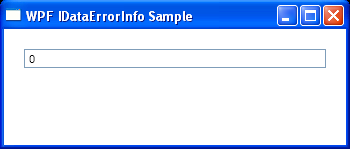Implement validation logic on custom objects and then bind to them(Mouse-over to see the validation error message).

<Window x:Class="WpfApplication1.Window1"
xmlns="http://schemas.microsoft.com/winfx/2006/xaml/presentation"
xmlns:x="http://schemas.microsoft.com/winfx/2006/xaml"
Title="WPF IDataErrorInfo Sample" Width="350" Height="150"
xmlns:src="clr-namespace:WpfApplication1">
<Window.Resources>
<src:Employee x:Key="data"/>
<Style x:Key="textBoxInError" TargetType="TextBox">
<Style.Triggers>
<Trigger Property="Validation.HasError" Value="true">
<Setter Property="ToolTip"
Value="{Binding RelativeSource={x:Static RelativeSource.Self},
Path=(Validation.Errors)[0].ErrorContent}"/>
</Trigger>
</Style.Triggers>
</Style>
</Window.Resources>
<StackPanel Margin="20">
<TextBox Style="{StaticResource textBoxInError}">
<TextBox.Text>
<Binding Path="Age" Source="{StaticResource data}"
ValidatesOnExceptions="True"
UpdateSourceTrigger="PropertyChanged">
<Binding.ValidationRules>
<DataErrorValidationRule/>
</Binding.ValidationRules>
</Binding>
</TextBox.Text>
</TextBox>
</StackPanel>
</Window>
//File:Window.xaml.cs
using System;
using System.Collections.Generic;
using System.Linq;
using System.Text;
using System.Windows;
using System.Windows.Controls;
using System.Windows.Data;
using System.Windows.Documents;
using System.Windows.Input;
using System.Windows.Media;
using System.Windows.Media.Imaging;
using System.Windows.Navigation;
using System.Windows.Shapes;
using System.ComponentModel;
namespace WpfApplication1
{
public partial class Window1 : Window
{
public Window1()
{
InitializeComponent();
}
}
public class Employee : IDataErrorInfo
{
private int age;
public int Age
{
get { return age; }
set { age = value; }
}
public string Error
{
get
{
return null;
}
}
public string this[string name]
{
get
{
string result = null;
if (name == "Age")
{
if (this.age < 0 || this.age > 50)
{
result = "Age must not be less than 0 or greater than 50.";
}
}
return result;
}
}
}
}
Related examples in the same category